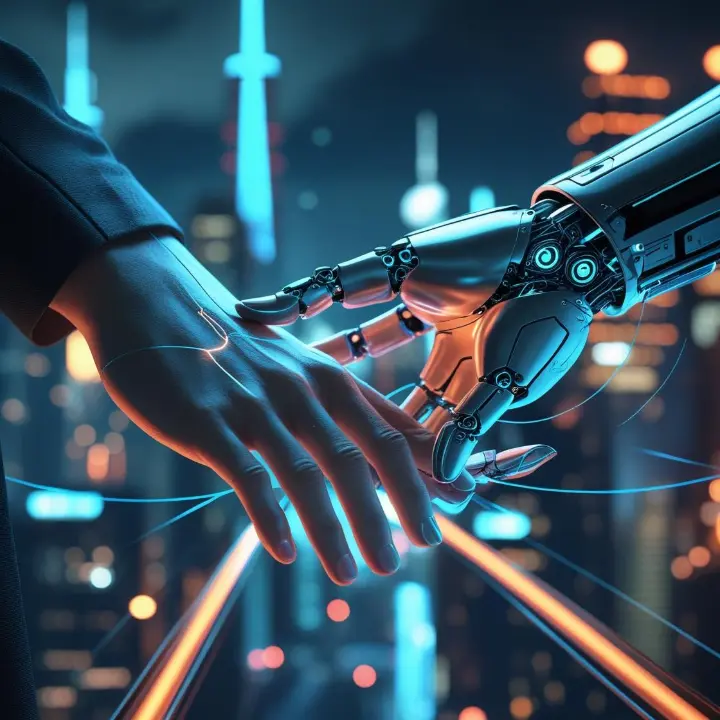Introduction: A New Era Dawns
In a world increasingly focused on data, algorithms, and automation, Artificial Intelligence (AI) is no longer a futuristic idea. It is the reality that shapes our lives in unique ways. From personalized recommendations on streaming platforms to self-driving cars and smart medical diagnostics, AI has quickly gone from science fiction to daily life.
At Taaza Khabar, we explore how this technological revolution is reshaping what people thought was possible.
What is Artificial Intelligence?
Artificial Intelligence simulates human intelligence in machines that can think, learn, and solve problems. These systems perform tasks that usually require human intelligence, such as understanding natural language, recognizing patterns, making decisions, and learning from experience.
There are two main types of AI:
- Narrow AI: Designed for specific tasks (e.g., Siri, Google Translate).
- General AI: Theoretical AI that can perform any intellectual task a human can do.
While we are still far from achieving General AI, Narrow AI has already surpassed human performance in many specialized areas.
AI Beyond Human Capabilities: Real-World Examples
"
1. Healthcare Revolution
AI is changing medicine by providing faster and more accurate diagnoses than some human doctors in specific fields. Tools like IBM Watson Health and Google's DeepMind can detect diseases like cancer, diabetic retinopathy, and Alzheimer's with impressive accuracy.
AI applications in healthcare include:
- AI-powered imaging for early disease detection.
- Predictive analytics for personalized treatment plans.
- Virtual assistants that reduce doctor workloads.
- Chatbots that improve access to mental health services.
With AI, medical care is becoming more proactive, predictive, and personalized, going beyond what even the most skilled doctors can achieve on their own.
2. Autonomous Vehicles: Driving into the Future
Self-driving cars are among the most recognizable examples of AI. Companies like Tesla, Waymo, and Uber use AI-driven algorithms that enable vehicles to perceive their surroundings, make quick decisions, and navigate without human help.
These AI systems can react faster than human reflexes, making driving potentially safer, more efficient, and accessible to everyone.
3. AI in Creative Arts
Surprisingly, AI is now writing poetry, composing music, creating artwork, and even generating news articles. Tools like OpenAI's GPT (the one powering this blog) and DALL·E produce content that blends human creativity and machine learning.
While AI cannot replicate the emotional depth of human experience, it has pushed creative boundaries, introducing new forms of art and collaboration.
How AI is Redefining Human Experience
AI is not just taking over manual or repetitive tasks. It actively enhances human abilities, helping us make better decisions, discover hidden patterns, and gain insights we couldn’t access before.
Here’s how:
- Decision-Making: AI offers data-driven insights that go beyond human intuition, from business analytics to investment forecasting.
- Personalization: AI algorithms adapt online experiences, including product recommendations and customized learning paths.
- Accessibility: Voice assistants and smart devices make technology easier for people with disabilities.
- Automation: AI handles routine tasks, allowing people to focus on more meaningful work.
In short, AI is extending what it means to be human by boosting intelligence, improving creativity, and broadening our reach.
Ethical Considerations: Power Comes with Responsibility
As AI grows more powerful, ethical concerns also emerge. With significant power comes significant responsibility. Here are a few key issues:
- Bias in AI: AI systems can carry biases from their training data, leading to unfair results.
- Job Displacement: Automation poses a threat to jobs in sectors like manufacturing, customer service, and journalism.
- Privacy Risks: AI systems often depend on large data collection, raising worries about surveillance and data misuse.
- Autonomy and Control: Who is responsible if an AI makes an error, like a self-driving car causing an accident?
These challenges highlight the need for transparent, responsible, and ethical AI development.
The Future of AI: What Lies Ahead?
Experts believe that in the next decade, AI will be more integrated into our daily lives in ways we can’t fully envision yet. Some possibilities include:
- AI in Education: Intelligent tutoring systems providing real-time feedback tailored to each student.
- Brain-Computer Interfaces (BCIs): One day, AI might interpret neural signals, allowing direct communication between humans and machines.
- Climate Change Solutions: AI modeling and prediction tools are already being used to address complex global issues like climate change and sustainability.
- Human-AI Collaboration: Future AI may work alongside humans—enhancing jobs rather than replacing them.
At Taaza Khabar, we believe the future of AI lies in collaboration—not domination—where machines empower humanity rather than overpower it.
India's Role in the AI Revolution
India is quickly becoming a global hub for AI. With a vast pool of tech talent, government initiatives like the National AI Strategy (NITI Aayog), and the emergence of AI startups, the country is set to lead in AI adoption.
Applications of AI in India include:
- Agriculture: AI is used for crop prediction, soil health monitoring, and pest control.
- Education: Edtech platforms use AI to personalize learning for students in regional languages.
- Healthcare: Telemedicine and AI diagnostics are connecting rural and urban healthcare services.
India’s demographic strengths, combined with innovation and entrepreneurship, position it at the forefront of inclusive AI development.
Final Thoughts: Embracing the AI-Powered Future
The power of AI goes far beyond convenience or efficiency. It is about rethinking the human experience—challenging our beliefs, expanding our skills, and prompting us to consider what it means to be human in a world where machines can think as well.
As we move through this transformative era, we must prioritize responsible innovation, ethical leadership, and inclusive growth.
At Taaza Khabar, we are dedicated to providing the latest updates, thorough analysis, and forward-looking stories to keep you informed and inspired.
The age of AI is not on the horizon—it’s already here. The question is: Are we prepared to look beyond?